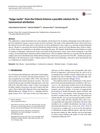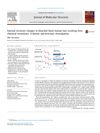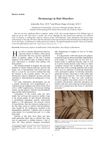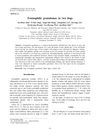 5 citations,
June 2012 in “Journal of Cosmetic Dermatology”
5 citations,
June 2012 in “Journal of Cosmetic Dermatology” Female pattern hair loss diagnosis is challenging and should use dermoscopy and histopathology instead of pattern recognition, as hormones may not always be the cause.
 5 citations,
March 2012 in “Microscopy Research and Technique”
5 citations,
March 2012 in “Microscopy Research and Technique” UVB radiation changes the chemical makeup and dries out human hair but doesn't alter its appearance or texture.
 5 citations,
November 2011 in “Expert Review of Dermatology”
5 citations,
November 2011 in “Expert Review of Dermatology” The document concludes that early diagnosis and a comprehensive treatment plan are crucial for managing hair loss in children, with a focus on both medical and psychological support.
 5 citations,
February 2011 in “Expert Opinion on Drug Discovery”
5 citations,
February 2011 in “Expert Opinion on Drug Discovery” We need better treatments for hair loss, and while test-tube methods are helpful, they can't fully replace animal tests for evaluating new hair growth treatments.
 5 citations,
June 2010 in “Endocrinología y Nutrición”
5 citations,
June 2010 in “Endocrinología y Nutrición” Diagnosing and managing PCOS in teens is hard, but early diagnosis and lifestyle changes are key, and more research is needed for long-term health.
 5 citations,
May 2008 in “Pediatric Diabetes”
5 citations,
May 2008 in “Pediatric Diabetes” Low-glycemic index diets are beneficial for weight loss and satiety, but more research is needed on long-term effects and individualized approaches are recommended.
 5 citations,
January 2005 in “Cytotherapy”
5 citations,
January 2005 in “Cytotherapy” The meeting highlighted important advances in stem cell research and its potential for creating new medical treatments.
 5 citations,
August 2003 in “British Journal of Dermatology”
5 citations,
August 2003 in “British Journal of Dermatology” Iron deficiency might contribute to hair loss in women.
 5 citations,
July 2003 in “Drug Development Research”
5 citations,
July 2003 in “Drug Development Research” Fluridil promotes hair growth safely and effectively for androgenetic alopecia.
 5 citations,
March 2001 in “Clinics in Dermatology”
5 citations,
March 2001 in “Clinics in Dermatology” Diagnose and manage hair issues in women by checking medical conditions and using personalized treatments.
 5 citations,
January 1998 in “Clinical and experimental dermatology”
5 citations,
January 1998 in “Clinical and experimental dermatology” Myotonic dystrophy should be considered in patients with hair thinning, and genetic counseling is important.
 5 citations,
June 1994 in “Journal of Cutaneous Pathology”
5 citations,
June 1994 in “Journal of Cutaneous Pathology” No CD44 in alopecia areata, present in normal and androgenetic alopecia.
4 citations,
June 2023 in “Frontiers in immunology” JAK inhibitors help hair regrowth in alopecia areata but have a high risk of side effects.
 4 citations,
June 2021 in “Dermatology”
4 citations,
June 2021 in “Dermatology” Scientists created a 3D skin model to study a chronic skin disease and test treatments.
 4 citations,
April 2021 in “Journal of Cosmetic Dermatology”
4 citations,
April 2021 in “Journal of Cosmetic Dermatology” Botulinum toxin may help hair loss by increasing blood flow and reducing harmful factors.
 4 citations,
March 2020 in “BMC Research Notes”
4 citations,
March 2020 in “BMC Research Notes” Skin tags in obese individuals may indicate higher cardiovascular risk.
 4 citations,
September 2019 in “Biomedical Papers/Biomedical Papers of the Faculty of Medicine of Palacký University, Olomouc Czech Republic”
4 citations,
September 2019 in “Biomedical Papers/Biomedical Papers of the Faculty of Medicine of Palacký University, Olomouc Czech Republic” CD2 might be a new treatment target for patchy alopecia areata.
 4 citations,
June 2019 in “International Journal of Dermatology and Venereology”
4 citations,
June 2019 in “International Journal of Dermatology and Venereology” Some skin diseases may indicate a higher risk of metabolic syndrome and related health issues.
 4 citations,
September 2018 in “Rendiconti lincei. Scienze fisiche e naturali”
4 citations,
September 2018 in “Rendiconti lincei. Scienze fisiche e naturali” Researchers concluded that "spigo nardo" is the Himalayan plant Nardostachys jatamansi, used historically in medicine and cosmetics, now critically endangered.
 4 citations,
July 2017 in “Archivum Immunologiae et Therapiae Experimentalis”
4 citations,
July 2017 in “Archivum Immunologiae et Therapiae Experimentalis” Retinol may affect immune responses in people with frequent skin boils.
 4 citations,
September 2016 in “Molecular Medicine Reports”
4 citations,
September 2016 in “Molecular Medicine Reports” Specific genes influence hair and cashmere growth in Laiwu black goats.
 4 citations,
August 2016 in “JEADV. Journal of the European Academy of Dermatology and Venereology/Journal of the European Academy of Dermatology and Venereology”
4 citations,
August 2016 in “JEADV. Journal of the European Academy of Dermatology and Venereology/Journal of the European Academy of Dermatology and Venereology” Using cetirizine on the skin and taking vitamin D can help increase hair growth in children with hair loss from ectodermal dysplasia.
 4 citations,
January 2016 in “Dermatology online journal”
4 citations,
January 2016 in “Dermatology online journal” Using bacitracin zinc and selenium sulfide one after the other can temporarily turn white hair yellow.
 4 citations,
January 2015 in “Hair therapy & transplantation”
4 citations,
January 2015 in “Hair therapy & transplantation” Hair follicle stem cells could be used to treat the skin condition vitiligo.
 4 citations,
August 2014 in “Journal of molecular structure”
4 citations,
August 2014 in “Journal of molecular structure” Chemical treatments on bleached black hair change its internal structure by breaking and reforming bonds, and treatments with hydrolyzed eggwhite protein help repair it.
 4 citations,
January 2013 in “Advances in Experimental Medicine and Biology”
4 citations,
January 2013 in “Advances in Experimental Medicine and Biology” Certain transcription factors are key in controlling skin stem cell behavior and could impact future treatments for skin repair and hair loss.
 4 citations,
September 2012 in “Journal of Nanoscience and Nanotechnology”
4 citations,
September 2012 in “Journal of Nanoscience and Nanotechnology” Dermoscopy helps dermatologists diagnose different types of hair loss accurately without always needing a biopsy.
 4 citations,
September 2011 in “Expert Review of Dermatology”
4 citations,
September 2011 in “Expert Review of Dermatology” Various treatments exist for alopecia areata, but none are completely satisfactory; choice depends on age, disease extent, and preference.
 4 citations,
March 2011 in “Korean Journal of Veterinary Research”
4 citations,
March 2011 in “Korean Journal of Veterinary Research” Two dogs in Korea were diagnosed with a rare skin condition usually seen in cats.
 4 citations,
March 2009 in “British Journal of Dermatology”
4 citations,
March 2009 in “British Journal of Dermatology” The conference highlighted new dermatological treatments and emphasized early intervention and addressing conditions lacking evidence-based treatments.





























